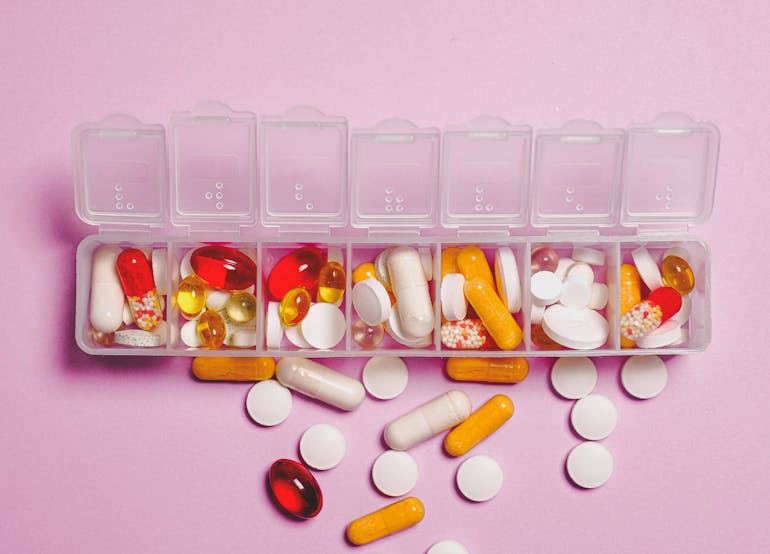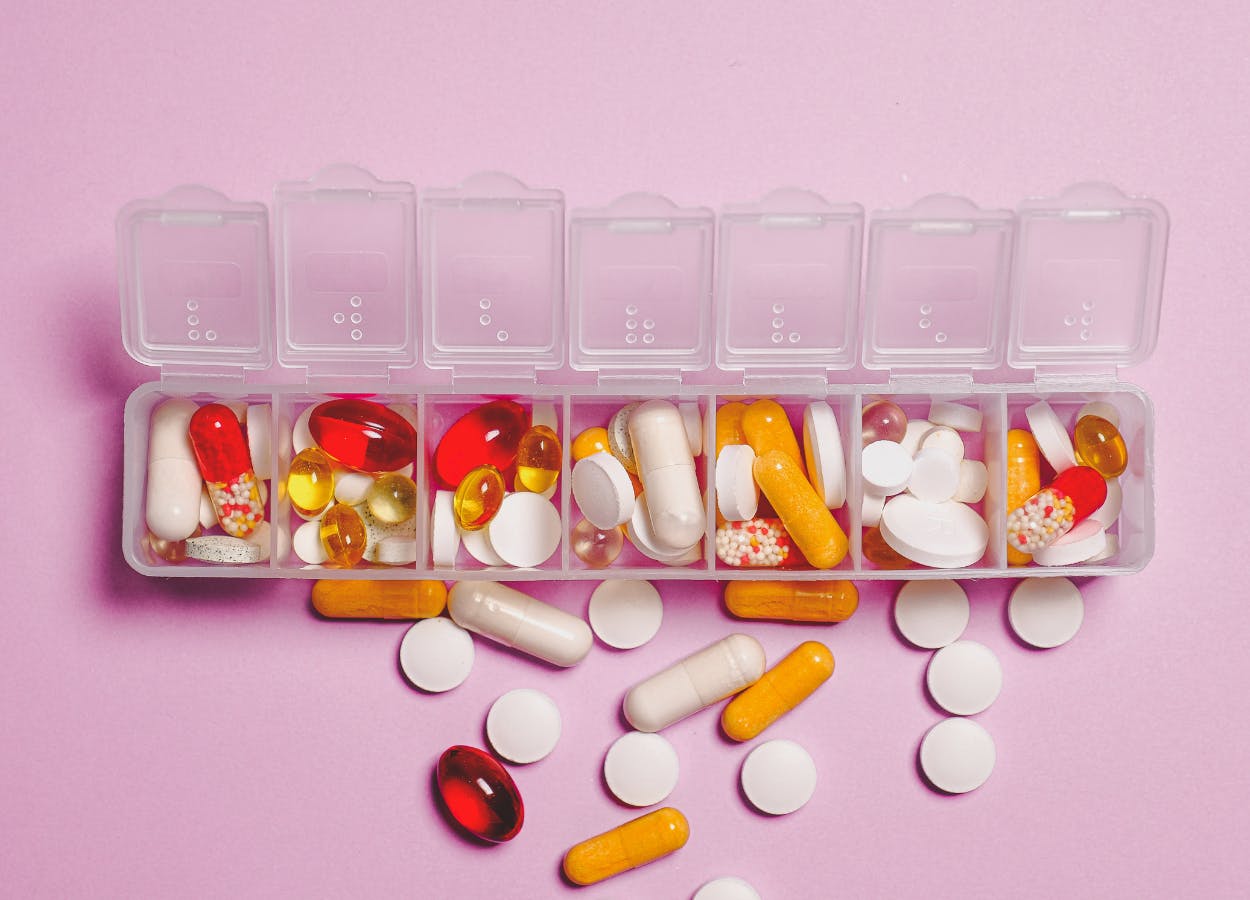What are the 13 vitamins your body needs?
Reviewed and fact-checked by Giulia Guerrini, Superintendent Pharmacist. Read our editorial policy to see how we create informative, accurate content.
Vitamins are an essential nutrient for your body. There are 13 that your body needs to function properly and stay healthy. Each has its own function within the body and is important for different reasons, whether it’s to boost your immune system, give you energy or even help out during pregnancy.
For most people, you can get all the vitamins you need in a healthy, balanced diet – but there are some stages in your life where you might need a little help, and that’s where vitamins and supplements can help. Not sure if you need supplements or not? We can help – but first, let’s take a look at the vitamins your body needs.
The 13 essential vitamins
The vitamins your body needs on a daily basis are vitamins A, C, D, E, K and the B vitamins (B1, B2, B3, B5, B6, B7, B9 and B12). You need vitamins C, B1, B2, B3, B5, B6, B7 and B9 in your diet every day. That’s because they’re not stored in the body and you remove any excess of them in your urine, so these vitamins need to be replenished daily. Vitamins A, D, E and K are all fat-soluble, and so can be stored in the body, while B12 is water soluble and so can be stored in the liver. Because you store an excess of these vitamins, you don’t necessarily need them in your diet every day – but it’s important that you have enough stored to equal your daily amount if you’re not getting it in your diet.
Let’s take a closer look at the 13 essential vitamins:
Vitamin A (Retinol)
Vitamin A, or Retinol, is a fat-soluble vitamin that has several important functions. First of all, this vitamin is important for your vision, as it helps you see in dim light (stay tuned if you think you can ditch the carrots…). Vitamin A also helps to keep the skin and some linings of your body healthy, as well as being an important vitamin for keeping your immune system working properly.
You can get this vitamin as part of a healthy diet: you’ll find Vitamin A in cheese, eggs, oily fish, pâté, and milk. You can also convert beta-carotene into vitamin A, which is found in carrots (see!), sweet potatoes, red peppers, and mangos. The NHS recommends that men need 700µg of retinol a day and women need 600 µg. As vitamin A is fat-soluble, you don’t necessarily need this amount every day – you’ll store any that you don’t use.
Vitamin C (Ascorbic Acid)
According to the NHS, adults need 40mg of Vitamin C (also known as ascorbic acid) each day. You can’t store Vitamin C in the body, so you need to get it in your diet every day.
A wide variety of fruits and vegetables contain vitamin C, so you should be able to get everything that you need with a balanced diet. Some good sources of ascorbic acid include broccoli, potatoes, oranges, strawberries, and peppers.
Vitamin C helps with healing wounds, maintaining healthy skin, hair, bones, blood vessels and cartilage, and it also helps to protect cells. This vitamin also has quite a few roles in supporting the immune system.
Vitamin D
Your body can create vitamin D from direct sunlight on the skin – that’s why it’s called the ‘sunshine vitamin’. However, during the winter months (normally from October to March), this can be difficult if you’re UK as the sun just isn’t strong enough. Although vitamin D is found in some foods such as oily fish, egg yolks, liver, and fortified foods, it can be a good idea to take a vitamin D supplement during those darker months. Find out more about taking a vitamin D supplement during the winter.
Vitamin D is important as it helps to regulate calcium and phosphate in the body. These nutrients in turn help to keep bones, teeth and muscles healthy. A lack of vitamin D, especially in children, can cause serious conditions such as rickets – and in adults, it can cause bone pain caused by osteomalacia. Because of it’s so important for your little one’s development, Vitamin D is commonly included in kids vitamins.
Vitamin E
Vitamin E is vital for maintaining healthy skin and eyes, and it’s also an important vitamin for the immune system. Men need 4mg of vitamin E a day and women need 3mg.
You should be able to get all the vitamin E you need with a healthy, balanced diet as it’s found in a wide variety of foods. Plant oils, nuts and seed are all good sources of this vitamin. As this vitamin is fat-soluble, you can store any that you don’t use in a day for later in your body, so you might not necessarily need this amount in your diet every day.
Vitamin K
Found in green leafy vegetables, cereal grains and vegetable oils, vitamin K is actually a group of vitamins. You should be able to gain all the vitamin K you need in your diet: adults need 1µg of vitamin K per kg of body weight. As this is a fat-soluble vitamin you don’t necessarily need this much every day – as before, any you don’t use is stored for the future.
Vitamin K helps with blood clotting and is important in healing wounds. There’s also some evidence that vitamin K could be important for bone health.
Vitamin B1 (Thiamin)
There’s a lot of B vitamins – and the first one that we’ll look at, Thiamin (B1), helps you to break down food and release energy from the food you eat. Thiamin also plays a role in keeping your nervous system healthy.
Vitamin B1 can’t be stored in your body, so you need it in your diet every day – luckily, you should be able to get all you need from there. Good sources include nuts, liver, wholegrain breads and peas. It’s recommended that women have 0.8mg of thiamine a day and men have 1mg.
Vitamin B2 (Riboflavin)
Vitamin B2, or Riboflavin, is found in a variety of foods such as milk, eggs, mushrooms and fortified breakfast cereals. Women should have 1.1mg a day and men need 1.3mg, which you should be able to get through your diet. It’s important that you have Riboflavin in your diet everyday as it can’t be stored in the body. B2 is important for keeping the skin, nervous system and eyes healthy, and it also helps to release energy from food.
Vitamin B3 (Niacin)
Niacin, or vitamin B3, can be found in two forms in your food: nicotinic acid and nicotinamide. These forms of B3 can be found in meat, wheat flour, eggs, and fish. An adult man requires 16.5mg of Niacin a day, and a woman needs 13.2 mg. This vitamin can’t be stored in the body, so you need to get it in your diet everyday.
Vitamin B3 has a number of functions in the body – it helps to release energy from food, as well as keeping the skin and nervous system healthy.
Vitamin B5 (Pantothenic Acid)
More commonly known as pantothenic acid, vitamin B5 helps you to release energy from food. There’s no set amount in the UK for how much you need on a daily basis, but vitamin B5 can’t be stored in your body, so you need it in your diet every day. Luckily, it’s found in almost all vegetables, wholegrain foods and meat. Good sources include eggs, mushrooms, avocado, and chicken.
Vitamin B6 (Pyridoxine)
Vitamin B6, or pyridoxine, helps the body to use and store energy. It also helps your body to make haemoglobin, which carries oxygen around the body in red blood cells.
This vitamin can’t be stored in the body, so you need it in your diet every day. Women need 1.2mg a day and men need 1.4mg a day. B6 is found in a variety of foods, so you should be able to get all you need from your diet. Some good sources include peanuts, oats, pork, chicken and bananas.
Vitamin B7 (Biotin)
Vitamin B7, also known as Biotin, is only needed in very small amounts to help the body make fatty acids. You can find Biotin in a wide variety of foods, but it is only found in very small amounts too. However, it isn’t clear if we actually need vitamin B7 from our diet – that’s because the bacteria that live in your bowel make this vitamin.
Vitamin B9 (Folate)
Vitamin B9 is known as ‘folate’ in its natural form, which is found in a variety of foods. Folic acid is the manmade form of this vitamin. This vitamin is important for healthy red blood cells, but you might know it as a prenatal vitamin: it helps to reduce the risk of various birth defects, making it a common pregnancy supplement.
Adults need 200µg of folate each day. Your body can’t store this. vitamin, and so you need to get it from your diet on a daily basis. You can find folate in broccoli, kale, peas, chickpeas, and liver. Because it plays such an important role in reducing birth defects, women trying to get pregnant and pregnant women are usually advised to take a 400µg folic acid supplement daily.
Vitamin B12
Every adult needs 1.5µg of vitamin B12 each day. This vitamin can be stored in the body as it’s water soluble, so you might not actually need to make sure it’s in your diet every day. Sources of this vitamin include meat, milk, eggs, and fish. However, B12 isn’t naturally found in fruit, vegetables and grains, so if you’re following a vegan diet, you might struggle to get your daily intake – that’s where a supplement can help.
B12 has quite a few important roles in the body: for example, it helps you to use folate (vitamin B9). B12 also helps you to release energy from food, make red blood cells, and helps to keep the nervous system healthy.
Do you need to take vitamin supplements?
Many adults can get all the essential vitamins they need in their diet. But if you need a little help to get everything you need, you’re not alone. Certain [health conditions]https://www.webmd.com/diet/features/what-vitamin-should-i-take) may mean that you have trouble absorbing nutrients too, and so a supplement can help. If you have a restricted diet, such as being vegan, you may also need supplements to get enough vitamin B12.
The NHS also recommends you take vitamin supplements at different times in your life. For instance, a folic acid supplement is recommended during pregnancy. Children aged 6 months to 5 years should also take supplements containing vitamins A, C, and D. It’s also recommended that adults take a vitamin D supplement during the winter months when there isn’t a lot of sunlight to help your body produce vitamin D. Before you decide to take any supplements, make sure to speak to your doctor first – you always want to keep them in the know and get more advice.
How to know if you need vitamin supplements
If you’re worried about whether you are getting enough vitamins in your diet, there are some common signs of vitamin deficiencies. These symptoms include:
- Brittle hair and nails
- Poor night vision
- Dandruff
- Cracks in the corners of your mouth
- Hair loss
- Bleeding gums
If you have any of the above symptoms and want to take a supplement, speak to your doctor first (especially if your symptoms don’t go away).
Getting enough vitamins in your diet is so important for helping your body to stay healthy and working as it should. Most people can get there with a well-balanced diet, but if you're struggling for any reason, take a look at our vitamin and mineral supplements to help you get the vitamins you need.


